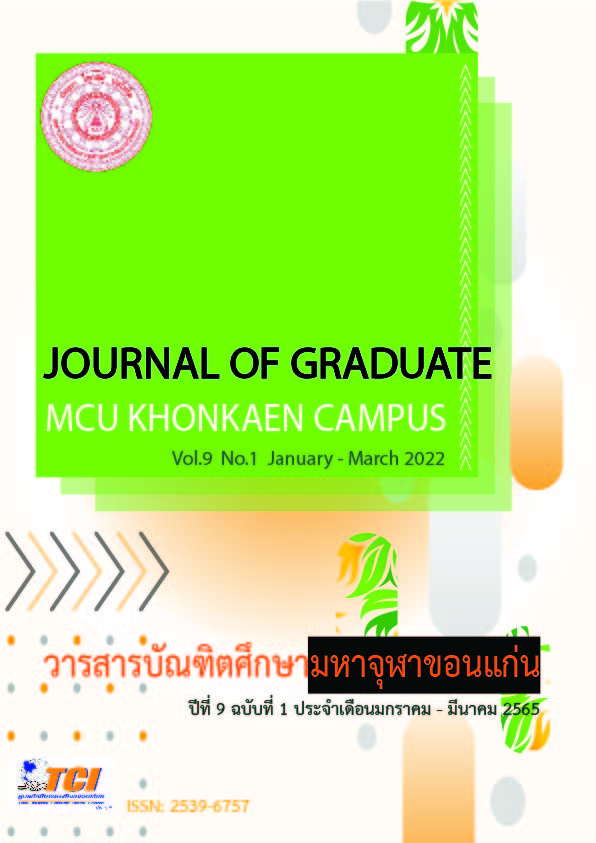Role of Monks in Wisdom Stimulation in the New Normal Era Role of Monks in Wisdom Stimulation in the New Normal Era
Main Article Content
Abstract
Role of Priests in wisdoms Stimulation in the New Normal Era It is the monks acting to stimulate the wisdoms. To solve various problems is to use wisdoms to solve problems of self and society. By being aware of the problems that arise to be informed don't panic In a situation where the novel coronavirus disease 2019 (Covic-19) is spreading in Thai society, by using mindfulness and applying the ten principles of the Kalama Sutta to analyze, collect data, reflect, find reasons, consider the problems that arise. This article aims to 1) Study the concepts of monks' roles in wisdoms stimulation in the New Normal era. 2) Guidelines for developing the roles of monks in New Normal wisdoms stimulation through 3 types of wisdoms: 1) Wisdoms from Listening 2) Wisdom from thinking
3) wisdoms from practice in solving problems in a systematic way Considering problems and finding solutions to problems in economic, social, political, and the epidemic
of coronavirus disease 2019 (Covic-19) to be able to adjust the body and mind to be able to live mindfulness
Article Details

This work is licensed under a Creative Commons Attribution-NonCommercial-NoDerivatives 4.0 International License.
References
กัญญภัค แมกกี้. (2561). ปัญญาในพุทธปรัชญาเถรวาท. วารสารปรัชญาปริทรรศน์, 23(1), 114-123. งามพิศ สัตย์สงวน. (2538). การจัดระเบียบทางสังคมใน สังคมและวัฒนธรรม. (พิมพ์ครั้งที่ 5). กรุงเทพมหานคร: จุฬาลงกรณ์มหาวิทยาลัย.
ชัยเสฏฐ์ พรหมศรี. (2561). ภาวะผู้นำสำหรับผู้บริหารองค์การ : แนวคิด ทฤษฎีและกรณีศึกษา. กรุงเทพมหานคร: สำนักพิมพ์ปัญญาชน.
เดลินิวส์. (2563). สติสู้โควิด-19 สร้างการตื่นรู้ สู้กับการตื่นตระหนก. สืบค้นเมื่อ 11 กันยายน 2564, จาก https://www.dailynews.co.th/article/763307/
ติน ปรัชญพฤทธิ์. (2538). ทฤษฎีองค์การ. (พิมพ์ครั้งที่ 3). กรุงเทพมหานคร: ไทยวัฒนาพานิช.
ไทยรัฐออนไลน์. (2563). ราชบัณฑิตบัญญัติ “นิวนอร์มอล” “ความปกติใหม่”. สืบค้นเมื่อ 9 กันยายน 2564, จาก https://www.thairath.co.th/news/local/1843766
บ้านจอมยุทธ. (2543). ปัญญา 3. สืบค้นเมื่อ 19 กันยายน 2564, จาก https://www.baanjomyut.com/pratripidok/30.html
พนมกร คำวัง. (2562). พุทธปัญญาเพื่อการพัฒนาตนในปรัชญาเซน. วารสารนวัตกรรมการศึกษาและการวิจัย, 3(3), 190-196.
พระครูปลัดบุญยัง ทูลฺลฺโภ (สุนทรวิภาต) และ พระมหาสมบัติ ธนปญฺโญ. (2558). บทบาทพระสงฆ์กับการเผยแผ่ยุคปัจจุบัน. วารสารครุศาสตร์ปริทรรศน์, 2(3), 132-138.
พระธรรมปิฎก (ป.อ.ปยุตฺโต). (2531). การพัฒนาปัญญา. สืบค้นเมื่อ 16 กันยายน 2564, จาก https://www.watnyanaves.net/th/book_detail/297
พระธรรมปิฎก (ป.อ.ปยุตฺโต). (2531). การพัฒนาปัญญา. สืบค้นเมื่อ 16 กันยายน 2564, จาก https://www.watnyanaves.net/th/book_detail/297
พระราชวรมุนี (ป.อ.ปยุตฺโต). (2530). บทบาทของพระสงฆ์ในสังคมไทย. กรุงเทพมหานคร: กรมการศาสนา. รัฐรพี พิพัฒน์ธนวงศ์ และคณะ. (2562). การพัฒนาปัญญามนุษย์เชิงบูรณาการแนวพุทธ. วารสาร มจร สังคมศาสตร์ปริทรรศน์, 8(4), 155-166.
วิระวัลย์ ดีเลิศ และ ปณัฐ อนุรักษ์ปรีดา. (2562). หนังสือวาทกรรมคำสอนของพระพรหมมังคลาจารย์ (ปัญญานนฺทภิกขุ). วารสารสถาบันวิจัยญาณสังวร, 10(2), 117-130.
สยามรูมเมท. (2564). การพัฒนาปัญญามนุษย์เชิงบูรณาการแนวพุทธ. วารสาร มจร สังคมศาสตร์ปริทรรศน์, 8(4), 155-166.
สำนักงานสถิติแห่งชาติ. (2561). เผยผลสำรวจสภาวะทางสังคม วัฒนธรรม และสุขภาพจิต. สืบค้นเมื่อ 11 กันยายน 2564, จาก http://www.nso.go.th/sites/2014/Pages/News/2561/N21-09-61-1.aspx
อรปวีณ์ ธรรมานุชิต. (2559). บทบาทของคณะผู้บริหารในฐานะผู้นำการเปลี่ยนแปลงต่อการเตรียมความพร้อมขององค์กรปกครองส่วนท้องถิ่น เพื่อก้าวสู่การเป็นประชาคมอาเซียน : กรณีศึกษาองค์การบริหารส่วนจังหวัดอุบลราชธานี. วารสารการบริหารปกครอง, 5(2), 180-196.
โอเคเนชั่นบล็อก. (2550). การกระตุ้นทางปัญญา. สืบค้น 9 กันยายน 2564, จาก http://oknation.nationtv.tv/blog/chimdee/2007/09/13/entry-1

